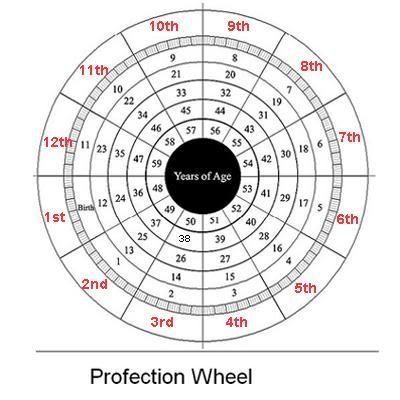The key is organization.
I used to go from House-to-House, but that got to be tedious,
so I started focusing only on activated Planets, and that works a lot better (for me).
Okay.
The ruler of the Sign in which the Profectional Ascendant falls is activated and becomes the Year Ruler.
Any Planets in that Sign are also activated, because they are disposited (ruled) by the Year Ruler.
I know most profect in 30° increments, and that's fine, but I profect by Oblique Ascension using Diurnal Hours. For example, if the Ascendant is 15° Sagittarius 45' then using 30° it will fall at 15° Capricorn 45' but profecting by Oblique Ascension using Diurnal Hours, it falls at 7° Capricorn 56'.
Continuing, 4° Aquarius 01' then 6° Pisces 35' all the way until you get to 15° Gemini 45' (7th House).
As you can see, there isn't a whole lot of difference, but occasionally you'll find charts where the Profected Ascendant will fall exactly on a Natal Planet or a Lot...and that's really intense, just as a Solar Return Planet falling exactly on the Profected Ascendant.
Anyway, one other thing to clarify is that it is the Sign that is activated, not the House.
Any Planets falling in the Sign will play a key role.
Planets transiting the Sign of the Profected Ascendant are important
I would consider the Exalted Sign for the Year Ruler.
If a Planet is not in its own Sign, then is important to be connected by sextile, square, trine or opposition.
That allows the Sign Ruler to manage the affairs in that House, even though he isn't physically there.
It's like you can leave home, but still be connected: you can call or e-mail, and a family member there,
or another you put in charge (the house-sitter, baby-sitter, dog-sitter) can take your instructions and carry them out.
If you have no connection to your home, then you really aren't in control.
Over time, Signs and Houses kind of got to be used interchangeably, even though they aren't necessarily the same thing. For Solar Returns, it's actually the Sign that comes to the Ascendant, not the House.
So, the Profected Asendant activates that Sign in your Natal Chart,
plus your Solar Return Chart,
and then the Sign that comes to your Solar Return Ascendant becomes activated in your both your Natal and Profectional Charts.
And of course the Ascendant Sign in your Natal Chart is always activated in the Solar Return Chart.
Uh, if I understand the question correctly, you're asking: "Now that I've identified the Rulers and Signs involved for the year, what the hell do I do now?"
Before you do that, you have figure out exactly what's going on.
You probably already evaluated the condition of the Planets in the SR Chart,
or at least the key players, and compared them to your Natal Chart.
I'll comment some more later, but right now I have to change a diaper, plan an invasion, butcher a hog, conn a ship, design a building, write a sonnet, balance accounts, build a wall, set a bone, comfort the dying, take orders, give orders, cooperate, act alone, solve equations, analyze a new problem, pitch manure, program a computer, cook a tasty meal, fight efficiently and die gallantly (because, you know, "specialization is for insects"...that's what Heinlein says).



